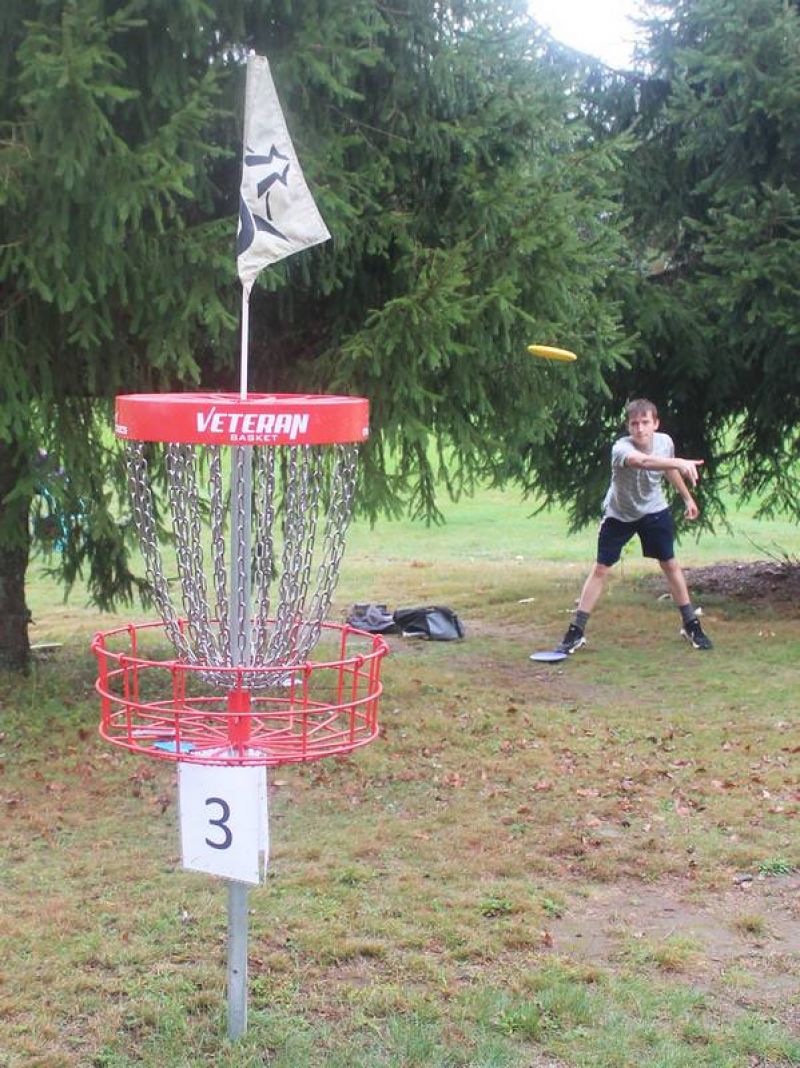Craig Bakay | Oct 20, 2021
Despite covid restrictions postponing an earlier attempt and various bouts of rain Saturday, the Hunter’s Creek Fall Fling Disc Golf began what the course owners hope will be the harbinger of things to come.
“We will have an inaugural tournament, probably in the spring,” said Cynthia Kennedy, who runs the course with husband Patrick Bassett. “But we wanted to get a tournament in to celebrate the fact that we now have an 18-hole disc golf course here, upgraded from the 9-hole course we had in the back of the property.
“We were hoping for 72 players but the because of the weather, about half cancelled. We’re still happy to have 37 participants though.”
Not that weather is always a deterrent to disc golfers. They play in the rain regularly and winter disc golf seems to be gaining in popularity.
(For those who were wondering, the ‘disc’ is what used to be called a ‘Frisbee’ but the generic disc is now used because Frisbee is proprietary.)
Other than the obvious equipment differences, disc golf and conventional golf are essentially the same game. The idea is to get to the hole (basket) in the fewest number of strokes (throws). The terms birdie, bogie, eagle, etc all still apply, as does the golden rule of etiquette (slower players wave faster players through).
The two biggest differences are the aforementioned fact that disc golf is played in all weather and seasons and the length of the course. Disc golf holes are shorter than conventional golf holes (300 feet versus 300 yards on average) such that a group of four conventional golfers will generally take four hours for a round of 18 holes whereas four disc golfers will generally take two hours.
Jeff MacKeigan of DiscGolfPark designed the Hunter’s Creek Course as well as numerous others. He said the game is still very much a grassroots movement but it’s growing all the time.
“When I joined the Professional Disc Golfers Association in 2015, my number was 86,191,” he said. “Now, it’s well over 200,000 and it’s huge in Finland which had 17 course in 2000 and now has 787.”
He said he designs course to challenge all levels of players with trees, water hazards, fades and such but foremost in his mind is etiquette.
“It’s important to make sure there’s collaboration, not conflict,” he said.
Disc golfers tend to be younger than conventional golfers, but so far, that hasn’t presented much of a problem.
“It’s a lot like when snowboarders started going to conventional ski hills,” he said. “At first there were skeptics but now they’re there all the time.”
He said that while he loves the game itself, the community is a special attraction.
“You put your name and phone number on your discs,” he said. “If you lose one, there’s a good chance you’ll get a call when somebody finds it.”
And the community tends to be good customers for the venue as well.
“A lot of players bought hoodies today,” he said. “Conventional golfers don’t buy a lot of hoodies.”
Another plus for the game is that kids can play often as well as the adults (Kennedy was hoping an eight-year-old recognized phenom from Toronto would show up but . . . weather). But even for adults, the learning curve tends to be quite shallow.
“I’ve taught people the game who end up with their first birdie on their first or second round,” MacKeigan said. “That’s a good feeling to achieve success early.”
And, it’s a business model that appears to be rising.
“There’s an annual tournament in Thunder Bay that started with 27 players,” he said. “Now it’s over 200 players and they’ve estimated the economic impact to the community at about $300,000.”
As for costs, green fees for 18 holes at Hunter’s Creek are $15 for 18 holes. That compares with $30 for conventional golf.
You’re going to need discs, which can range from $20 to $3,400 (a special disc sold at auction) and you’ll need at least three — a driver, a mid-range and a putter. Most regular disc golfers carry at least 12 and MacKeigan regularly carries 20.
“They all have different flight characteristics including speed (drivers), glide, turn and fade,” he said.
Like old-time golfers, he can go on and on as to the characteristics of the spade versus the mashe-niblick.
And then you’ll need a bag. The industry leader, GripEQ makes a range of backpacks from $259 - $179 as well as some cheaper sling packs. But all have one thing in common, a specialized pocket to carry your discs.
But if you’re not quite ready to jump in with both feet but would like to give it a go, Hunter’s Creek would be happy to rent you a set of discs.
They do take walk-ons but it’s highly recommended to call ahead for a tee time.
More Stories
- Burn Ban Off in North Frontenac, Addington Highlands - Reduced to Level One in South and Central Frontenac
- The Resurgent Sharbot Lake County Inn and Crossing Pub
- Towards Then End of Trail
- Silver Lake Pow Wow
- Central Frontenac Declares Former Office, Harvey Building, Surplus Properties
- Neighbours Could Lose The War Over Gravel Point - But Still Win The After Battle
- Sydenham Legion Bass Tournament
- From Performing Arts To The Written Word
- Legion Corner
- The Sun Shines On The Parham Fair

